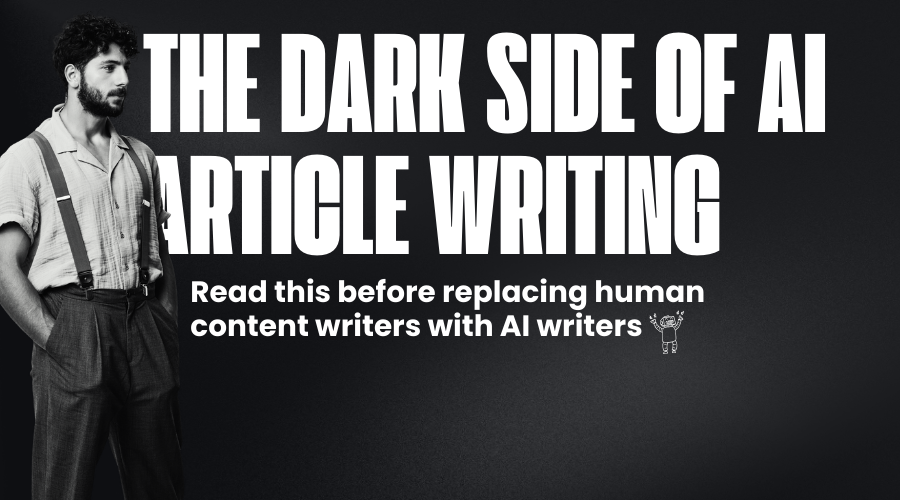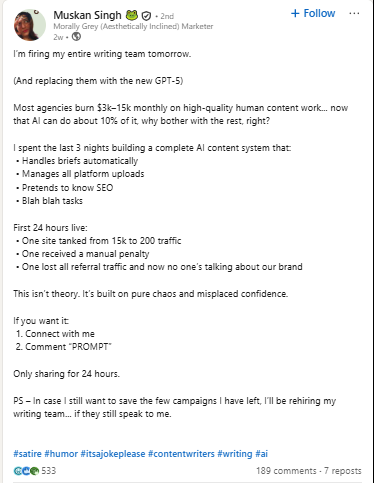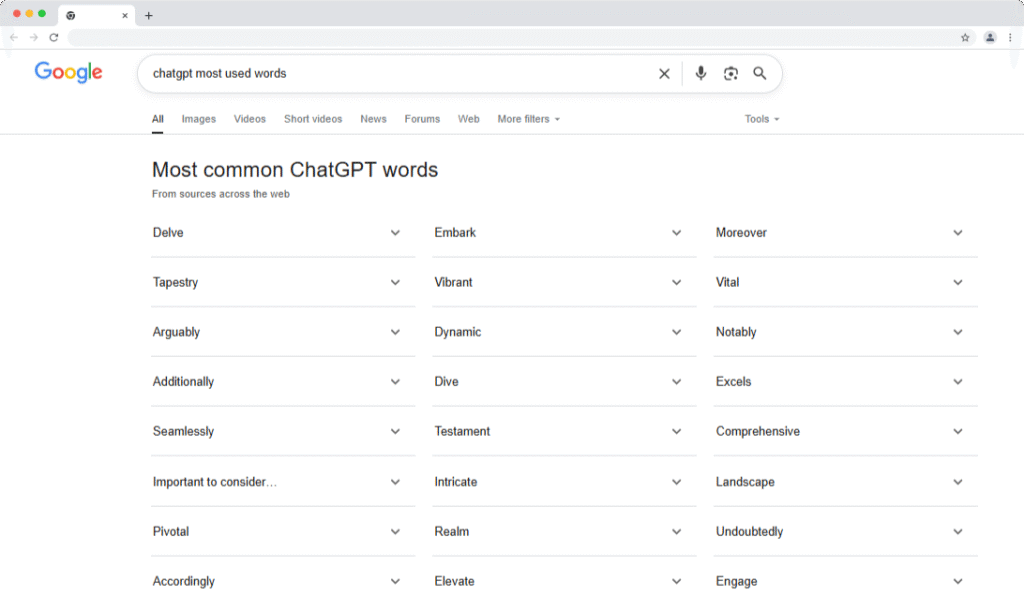
AI is inevitable. I get it.
If you’re not using AI, you’ll miss out on a lot of opportunities. I agree, actually!
I won’t beat around the bush on this.
Lots of companies are firing human writers for AI writers.

They believe that AI writing tools are cheaper, faster, and better.
Well, I don’t agree, and let me tell you why.
I have been in both shoes.
I built around 10 niche websites between 2022 and 2024 with AI-generated content on the side – I didn’t publish ChatGPT-spitted garbage. In fact, I used two paid AI writing tools and published every piece of content after slight editing.
I also kept losing regular clients who switched to AI writing tools. So, that’s why I said I have been in both situations.
My LinkedIn friend Syeda Saba Gardezi‘s response to Muskan Singh‘s LinkedIn post cracked me up:

Here’s what happens (in most cases) when publishers completely swap human writers with AI-based writing tools:
Google hits hard on sites that publish AI content
You’re about to find out why your AI blog got tanked, but let me debunk a myth about the publishing frequency of AI content.
Some bloggers and SEO experts believe that putting out a ton of AI-generated content triggers the algorithm, as it may be AI-generated content. So, such websites get clapped at some point.

Well, I have been there, and this is why I believe that it’s not the case. It doesn’t really matter whether you put out 100 pieces a week or if you publish 5 pieces per week.
In my opinion, Google is way smarter than most of us think it is. It can sense whether it’s the fresh content written by a human or AI-generated content, as in a spun version of existing information on the web.
Some of you might wonder: Does every website that publishes AI content get hit by Google?
The answer is no – some of them may get lucky or go undetected for some time.
Could those lucky sites ever get hit in the future? You might wonder.
Here’s the answer: Absolutely! They would get hit at some point in the future. It’s just a matter of “when” it happens, eventually.
The problem isn’t the quantity of blog posts you’re publishing due to the advent of AI writing tools; it’s the face value of the content being published.
A fresh piece of content that is coming straight from the writer’s mind may seem less effective on the outside, but it’s more valuable than an AI-generated article in Google’s eyes.
The reason is that human-written content adds a unique value to the web, whereas the AI content is the outcome of the crawled information on the internet and tells what already exists on the web.
Readers can spot the AI writing patterns in the content
AI writing tools have a way with choosing the words in the sentences. While it makes ChatGPT-written content more identifiable, it also helps editors review the content faster.
For instance, ChatGPT uses words like “delve,” “moreover,” “accordingly,” “undoubtedly,” and many others quite often.

Now, readers are way smarter than ever before, thanks to social media platforms like Quore, Reddit, X, and LinkedIn, where such discussions can easily go viral.
Another sneaky way of spotting the AI-written content is to see the use of the dash (—), which is also known as the em dash.
Most Windows laptop keywords don’t even have this symbol on them, whereas ChatGPT puts this symbol in almost every text it writes for users.
So, keep an eye out for these writing patterns in the AI content.
Search engines are reluctant to index AI-written blogs
I was running a handful of AI-based blogs when Google started tanking AI-written blogs. It was 2022-23 when the search giant’s algorithm turned against AI content.
Despite the claims of AI-written content as being okay, most AI-based niche blogs that were hit by search engine algorithm updates never came to life, which eventually drove many bloggers out of the industry.
A core reason why search engines probably hesitate to index AI websites, let alone rank them, is that these AI websites can be massively produced by anyone at any time.
Most of the AI writing tools give a heads-up to the users that AI-generated content may include some errors, so keep that in mind when consuming AI-based content.
 Enjoying my blog content? Show some love by funding this blog. Enjoying my blog content? Show some love by funding this blog. |
So, what’s the solution?
You’ll find every other person raving about AI tools on social media, but it doesn’t necessarily mean they’re the best option out there.
Sure, AI tools put out content faster, but fast doesn’t mean the best.
Always remember that an AI writing tool is going to churn out articles based on the information available on the internet.
Being a freelance content writer, I may be biased, but I’m crystal clear on this: I will never use an AI writing tool to write my blog posts. Ever!
Neither should you!
It doesn’t mean you shouldn’t use AI; in fact, you must use AI for ideation purposes – ask questions, search for keywords, brainstorm ideas, and fix grammar using AI tools.
The solution, however, is to find the writers who are subject matter experts or have authority in the niche. When you bring an experienced human writer on board, this person brings experience, expertise, and efficacy to the table.
Plus, the search engines think of you as someone who publishes fresh information instead of paraphrasing existing information.
Would you still use an AI writer or find a human writer who produces high-quality content for you? Let me know in the comments section!

No matter what, AI can hardly ever beat human intelligence and skills.
You’re damn right!